Focus on equity, infrastructure & academic excellence: Dr. Bilal
BUDGAM: In a detailed review meeting held today, Deputy Commissioner (DC) Budgam, Dr. Bilal Mohi-Ud-Din Bhat, evaluated the performance of the School Education department, emphasizing data-driven improvement, inclusive education, and effective governance.
Chief Education Officer Budgam briefed the chair regarding key highlights viz. access, enrolment & retention under which Gross Enrolment Ratio (GER) for Primary is 87.15%, for Secondary it is 111.7% and for Hr. Secondary it is 195.69%.
The chair was also briefed that a remarkable 97.4% of students progressed to the next educational level while drop-out rate was maintained at a low of 2.6%, indicating effective retention strategies. CEO said there are only 255, with just 144 never enrolled in the district.
Under Equity & Inclusion, the Gender Parity Index (GPI) in Budgam records an overall GPI of 967, with girls out numbering boys in higher secondary education. Children with Special Needs (CWSN) are 82% enrolled of identified CWSN, and inclusive infrastructure is expanding.
62% of schools have ramps and 47 have disabled-friendly toilets. CEO said Pupil-Teacher Ratio (PTR) in the district stands at 1:14, outperforming the NEP guideline of 1:30. Besides, 97% of teachers hold relevant academic and professional qualifications, teacher attendance stands at 95%, while student attendance is 70% (as per chatbot-based monitoring).
Under Digital & Vocational Education which includes ICT Integration 100% of secondary and higher secondary schools use smart classrooms, 59% of all schools utilize digital platforms like DIKSHA. 6385 students across 81 schools are enrolled in 14 different vocational trades.
Similarly, under Infrastructure & Facilities – 84% of schools operate from government-owned buildings. There are 97% (girls) toilets & 96% toilets for (boys). The drinking water facilities are available in 99.5% schools, 98% schools have electricity, 117 schools have Libraries, 122 schools have Laboratories and 328 schools have Playgrounds besides 100% distribution of textbooks stands completed for Grades 1-8th.
CEO said every school is visited twice weekly by zonal and cluster officers. There are School Management Committees (SMCs) functional in all schools.
He also briefed the chair that 94% of funds stand utilised during FY 2024–25 under Samagra Shiksha and other schemes.
Under PARAKH (NAS) 2024 Survey, emphasis is on competency-based learning under NEP 2020. Under the NIPUN Bharat initiative, Budgam is on track to ensure grade-legal proficiency by Grade 3.
While chairing the review, DC applauded the efforts of the teaching and administrative staff in ensuring continuous academic delivery and infrastructural development.
He emphasised that education is the cornerstone of inclusive development, and reiterated that every child in Budgam regardless of location, background, or ability deserves quality education that empowers them for life.
He stressed the importance of aligning all school-level interventions with the goals set under the National Education Policy (NEP) 2020, especially in achieving foundational literacy and numeracy at the primary level.
DC called for greater focus on real-time data monitoring to address learning gaps effectively, enhancing student attendance through community engagement and school-based counselling, regular academic audits and peer learning among teachers, especially in schools with low enrolment or dropout concerns.
“Budgam has the potential to become a model district for education in the UT of Jammu & Kashmir. We must now shift from access to excellence, from attendance to achievement, and from infrastructure to impact,” Dr Bilal remarked.
DC assured continued administrative and financial support for all genuine educational needs and encouraged the Education department to strive for innovative, inclusive and accountable educational governance.
The meeting was attended by CEO Budgam, DEPO Budgam, all ZEOs and officers from the Chief Education Office and other stakeholders.


